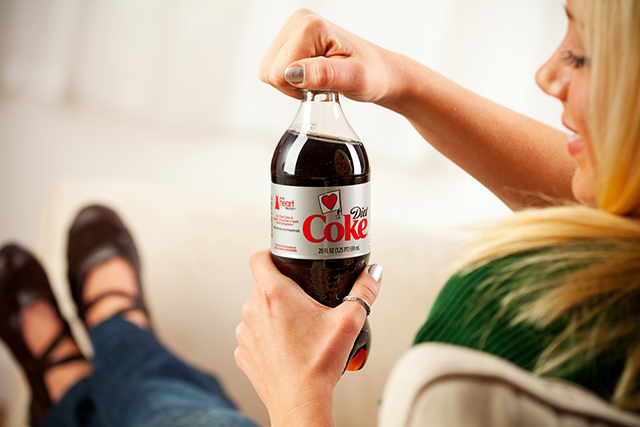
The artificial sweeteners found in the world’s most popular diet sodas may have a serious unintended consequence, according to a new study.
Calorie counters beware: That diet soda and your own stomach may be conspiring against you.
A study published Wednesday in the journal Nature suggests that consuming artificial sweeteners may increase the risk of elevated blood sugar levels.
When researchers added popular sweeteners – including saccharin and aspartame – to the diets of mice, the balance of bacteria in the gut shifted and blood sugar levels spiked. Similar results occurred in a subset of humans during a follow-up trial.
The study’s conclusion: “Non-caloric artificial sweeteners may exacerbate, rather than prevent, metabolic disorders such as glucose intolerance and diabetes.”
So is it time to back away from the Diet Coke? Perhaps not, says study author Dr. Eran Elinav of the Weizmann Institute of Science in Rehovot, Israel. He spoke with the PBS NewsHour on Tuesday to explain why.
PBS NEWSHOUR: Dr. Elinav, thank you for joining us. Your study seems so counterintuitive – that artificial sweeteners actually raise blood sugar levels. What did you find?
ELINAV: Our experiments suggest that in a subset of human individuals, artificial sweeteners may be associated with a tendency toward several disturbed metabolic parameters, especially focusing on disturbances in blood sugar levels. And the second important conclusion in both animal models and in humans is that we’ve shown that at least a part of these adverse effects are driven by artificial sweeteners inducing changes in our gut microbes. So we’ve shown that despite the fact that most of these chemicals are largely unabsorbed in our gut, they do encounter the trillions of bacteria that we all harbor within us. And in a subset of individuals, they make very substantial changes to their function, which ultimately may lead to adverse blood sugar level effects in susceptible sub-populations.
PBS NEWSHOUR: And how are these artificial sweeteners doing this?
ELINAV: The artificial sweeteners in mice induce two major effects. The first effect is a very reproducible change in the composition of the gut microbes. Some of the gut microbes are greatly expanded in their numbers while others are greatly reduced in their numbers. And the overall change we see in many different conditions in which we tested these artificial sweeteners in mice – including different doses and different formulations – lead to an obese state.
The second layer is the functional changes that artificial sweeteners induced. And there, we performed a very detailed genomic analysis and were able to come up with multiple metabolic pathways of these microbes that are significantly changing on exposure to artificial sweeteners. Some of these pathways induce via different mechanisms a tendency for obesity and diabetes in both animal models and in humans.
PBS NEWSHOUR: Were you surprised by the finding?
ELINAV: We started our studies and conducted our science without trying to bias ourselves. But yes, we were highly surprised. Because we have seen these quite significant metabolic changes in mice following prolonged consumption of artificial sweetener, which in some ways would be counter-intuitive. Many of us expected the opposite to occur.
PBS NEWSHOUR: There were also major limitations to your study.
ELINAV: Absolutely. There are no studies without limitations, and needless to say, our study – which covered mice and humans and a very large difficult-to-perform subject – has limitations. And one of the important limitations is that our short-term exposure study in humans is a very preliminary one in which we only tested seven individuals. But even with this small scale, we’ve shown that in a subset of individuals, even short-term exposure to saccharin was associated with induction of abnormal elevation of blood glucose as compared to the subset of people who did not react whatsoever to artificial sweeteners. And I think that while this cohort is very small, one very interesting and potentially important finding is that we were able to show causality – which is something that has really limited the sweetener issue for many years.
PBS NEWSHOUR: Is the evidence strong enough to suggest that people should change their behaviors?
ELINAV: As scientists, our role is to present our data and to present our results. And I think in this case, since there are limitations and since we are talking about results that should be corroborated and have very important possible implications to large populations of humans, that we’re not in a state of making recommendations at this stage. Our aim with this study is to show the results and discoveries and to raise a debate in the general, scientific and medical communities – and to reassess this massive and unsupervised use of artificial sweeteners. By saying ‘reassess,’ I think the first thing we need to do is to raise public awareness. And the second would be to create more studies that would test these effects.
The fact that we have shown that some subset of individuals may be reacting adversely to artificial sweetener use does not mean that we are in any way directly or indirectly recommending that anyone change his or her diet. And especially we are not recommending for people to increase their sugar consumption rather than consuming artificial sweeteners.
PBS NEWSHOUR: Have you changed your own diet as a result of these studies?
ELINAV: I have. I was a very heavy consumer, as was my colleague in this study, of artificial sweeteners. And since starting to study the effects of nutrition on microbiome and human health, our results, personally, raised questions which need to be assessed in future studies over whether some people may be affected positively and others negatively by artificial sweetener consumption. On a personal level, I try to avoid the risk. But this is a very personal decision and my opinions are not trying to persuade anyone to change their habits.
Editor’s Note: This interview was lightly edited for clarity.
